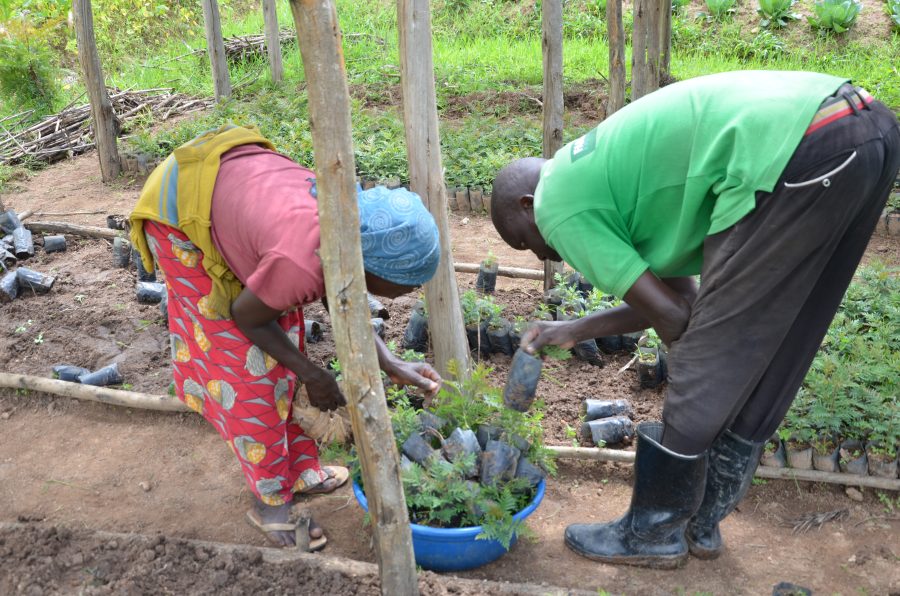Kamonyi: GCS Empowers Locals with Vital Skills to Tackle Life-Impacting Climate Change

In engaging with residents of Nyarubaka Sector in Kamonyi District today, the predominant topic is climate change—a term often associated with scientists. It’s remarkable that even farmers in Nyarubaka, some without formal education, express their intent to plant trees as a strategy to combat climate change.
This newfound awareness is credited to Global Civic Sharing (GCS), an international non-governmental organization supporting citizens of Kamonyi District through self-help groups (SHGs) with funds from with Korea International Cooperation Agency KOICA- KOICA. GCS initiated training programs on self-preservation, self-help groups, and subsequently, knowledge about agriculture and climate change.

Mukankusi Gertrude, a resident of Ruyanza Cell, received trees from GCS, accompanied by expert-led training on modern agriculture for food self-sufficiency and market development. Gertrude emphasizes the positive impact of these trees on soil conservation, preventing erosion, and their contribution to climate change mitigation. She shares,
“I even sold some of them and took money for my child’s school.”

Residents like BAYAVUGE Justin from Ngarama village acknowledge the importance of the 30 Greveria trees he recently received. He plans to plant them on the edges of his field to prevent erosion and enhance air quality, foreseeing future economic benefits. He states,
“It will also give me money once it grows; the tree will cost between 10 and 20 thousand Frw, so I get money for self-improvement.”
These agriculturally dependent individuals anticipate additional income through processing and selling these trees, investing in livestock, or other necessities.
Urimubenshi Venuste, a volunteer supported by GCS, expresses pride in reaching a level where he can assist the people of Kambyeyi Cell. He emphasizes the training received in conservation and modern farming techniques, leading to increased food production and market opportunities.

Volunteers like Urimubenshi, with the help of schools and model farms, also contribute to environmental protection by removing agroforestry trees, which are then distributed to the community to combat erosion and climate change.

Urimubenshi notes the positive impact on community awareness of agriculture and environmental protection, anticipating continued social development as a result.

The GCS initiative encompasses providing agricultural inputs, including fertilizers, beans, corn, and vegetables. Urimubenshi highlights,
“Thanks to the help of GCS, the people have an understanding of agriculture, they grow elite seeds, they use inputs, they get the results, so we progress.”

Irene Ibarushakugena, in charge of agriculture and animal husbandry at GCS, explains the strategic approach to tree planting to safeguard the land, control erosion, and protect the environment while enhancing production. She adds,
“It will provide them with clean air to breathe. Besides fighting against climate change, the trees will serve as woods and timbers, charcoal, among other things.”
Aimable Twagirayezu, the GCS Country Representative, emphasizes the organization’s commitment to agroforestry for climate change adaptation. He acknowledges collaboration with the government of Rwanda, especially MINAGRI and Kamonyi District, expressing gratitude to nursery managers for their vital role in the project’s success. Twagirayezu says,
“We wish that our project participants would plan those trees for environmental conservation, soil erosion control, livestock, among other purposes. We request them to take care of such trees to grow and be useful in many ways.”

GCS has appointed agricultural advisors and educational assistants, conducting training programs for farmers in villages. The organization has prepared over 20,000 agroforestry trees for distribution to 40 saving groups across five cells.
Global Civic Sharing, founded in 1998 with headquarters in South Korea, operates in several countries, including Rwanda. The organization’s objectives include development assistance projects, civil-society empowerment, emergency relief assistance, and global exchange participation.
ND


